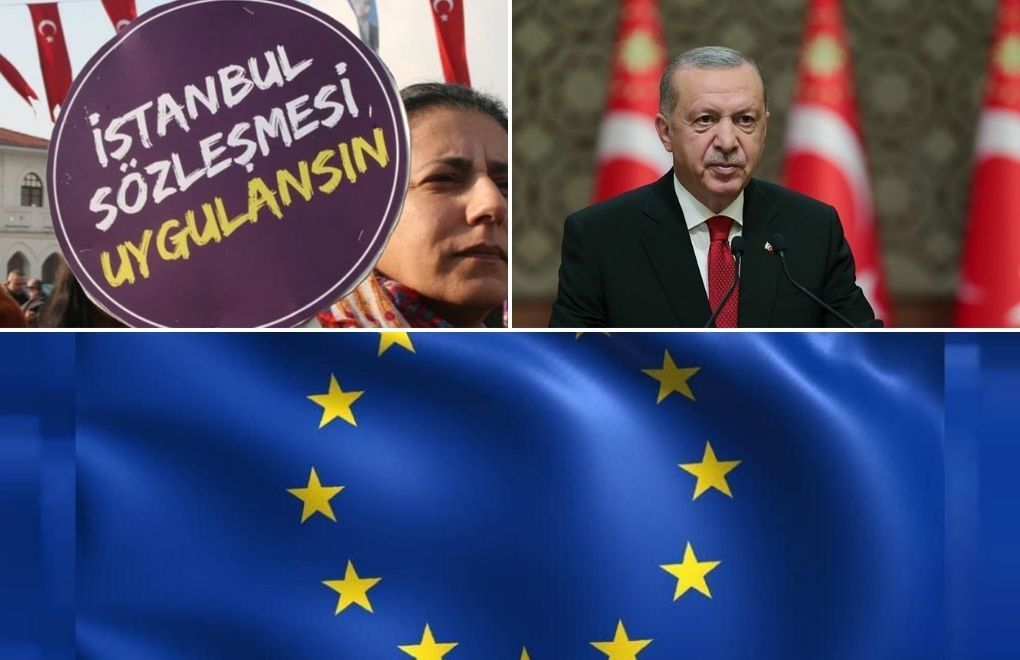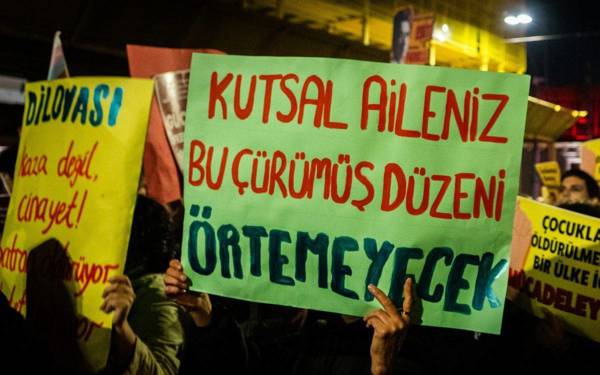Click to read the article in Turkish
With a Presidential decision dated March 19, Turkey has withdrawn from the İstanbul Convention or the Council of Europe Convention on Preventing and Combating Violence Against Women and Domestic Violence. That being the case, the country's withdrawal from the convention closely concerns its relations with the European Union (EU) as well.
Becoming a member of the European Union, one of the founding principles of which is to ensure fundamental rights and freedoms, has been a part of Turkey's state policy since the 1950s.
However, not only did Turkey fail to follow the road map put forward by the EU in the early 2000s, when the accession negotiations were still continuing, but it now also seems far away from this aim, especially when the recent developments are taken into consideration.
We have spoken with Nilgün Arısan, the European Union Institute Director of the Economy Policy Research Foundation of Turkey (TEPAV), about how Turkey's withdrawal from the İstanbul Convention is perceived by the EU. Arısan says that "the EU sees Turkey as a third country."
'Accession process fully suspended'
How do you find the reaction of the EU to Turkey's withdrawal from the convention? How do you think the union perceives Turkey?
As far as we understand from the statements made in the recent period, the European Union does not totally see Turkey as a country which is in the accession process, but sees it as a third country.
How do you think Turkey's failure to follow the road map put forward by the EU for accession affect the relations?
European Union has totally given up on this part. It wants Turkey to conform in the Eastern Mediterranean and to not fight with Greece, even if it cannot solve its problem with the country. There is a stance of 'That is enough if it does not cause tension.' Unfortunately, the European Union does not have any other expectation from Turkey than this.
Why does the EU turn a blind eye to these rights violations?
There was an expectation for a new update between the European Union and Turkey. It could have happened, actually.
It was about the lifting of visa requirements and the update of the Customs Union agreement. They are all off the agenda now. The European Union sees Turkey in the same category as Russia and China.
European Union is dependent on Turkey with regards to refugees. It says, "Do whatever you want, but don't send the refugees." It has a sensitivity about only this issue. When it comes to other issues, Turkey says, "It is my domestic affairs." There is a win-win situation for both parties.
Europe says, "Let me give you money for refugees." And Turkey needs the money. Turkey says, "Don't interfere with other matters." And the European Union accepts it. It is how it is for the policy makers. It is at least the case for the policy makers of both sides.
But it is not how the European Parliament approaches the issue. For the European Union, the accession process was not functioning anyway. It would be safe to say that it has been fully suspended now.
About Nilgün ArısanNilgün Arısan Eralp has been working at TEPAV since 2009 as the Director of the European Union Institute. Eralp worked as an advisor from 1987 to 1996 in several senior public authorities including the Ministry of State in charge of EU Affairs and Deputy Prime Ministry, and Prime Ministry of Turkey. From 1990 to 1992, Eralp worked as an expert in State Planning Organization, Directorate General for EU Affairs. In 1996 Eralp coordinated the 'Information Network Project for Small and Medium Sized Enterprises on Customs Union' jointly financed by the Economic Development Foundation (İKV) and the European Commission. Between 1997 and 2000, Eralp functioned as the Head of Department of Policies and Harmonization in the Directorate General for the EU Affairs at State Planning Organization. After leaving this position , Eralp served as the Director of National Programme in the Secretariat General for the European Union Affairs (EUSG) until 2009. Throughout this period Eralp has been a Member of Academic Board in European Research Centre, Ankara University on behalf of the EUSG. Eralp has lectured in several universities on EU and Turkey - EU relations and has several publications on the same topic. Nilgün Arısan Eralp was born in 1961. She holds a B.S. degree in Economics from Middle East Technical University, M.A. degree in Economic Development from Leicester University and M.Sc. degree in European Studies from London School of Economics. |
About İstanbul Convention
* Source: CoE The Council of Europe (CoE) "Convention on Preventing and Combating Violence Against Women and Domestic Violence", also known as "İstanbul Convention", is based on the understanding that violence against women is a form of gender-based violence that is committed against women because they are women. It is the obligation of the state to fully address it in all its forms and to take measures to prevent violence against women, protect its victims and prosecute the perpetrators. As of March 2019, it has been signed by 45 countries and the European Union (EU). On March 12, 2012, Turkey became the first country to ratify the Convention, followed by 33 other countries from 2013 to 2019 (Albania, Andorra, Austria, Belgium, Bosnia and Herzegovina, Croatia, Cyprus, Denmark, Finland, Estonia, France, Georgia, Germany, Greece, Iceland, Ireland, Italy, Luxembourg, Malta, Monaco, Montenegro, the Netherlands, Norway, North Macedonia, Poland, Romania, Portugal, San Marino, Serbia, Slovenia, Spain, Sweden, Switzerland). The Convention came into force on 1 August 2014. * Click here to read the full convention |
From İstanbul ConventionThe purposes, definitions and general obligations of the İstanbul Convention have been indicated in its first chapter of the as follows: Chapter I – Purposes, definitions, equality and non-discrimination, general obligations Article 1 – Purposes of the Convention The purposes of this Convention are to: a) protect women against all forms of violence, and prevent, prosecute and eliminate violence against women and domestic violence; b) contribute to the elimination of all forms of discrimination against women and promote substantive equality between women and men, including by empowering women; c) design a comprehensive framework, policies and measures for the protection of and assistance to all victims of violence against women and domestic violence; d) promote international co-operation with a view to eliminating violence against women and domestic violence; e) provide support and assistance to organisations and law enforcement agencies to effectively co-operate in order to adopt an integrated approach to eliminating violence against women and domestic violence. In order to ensure effective implementation of its provisions by the Parties, this Convention establishes a specific monitoring mechanism. Article 2 – Scope of the Convention This Convention shall apply to all forms of violence against women, including domestic violence, which affects women disproportionately. Parties are encouraged to apply this Convention to all victims of domestic violence. Parties shall pay particular attention to women victims of gender-based violence in implementing the provisions of this Convention. This Convention shall apply in times of peace and in situations of armed conflict. Article 3 – Definitions For the purpose of this Convention: a) "violence against women" is understood as a violation of human rights and a form of discrimination against women and shall mean all acts of gender-based violence that result in, or are likely to result in, physical, sexual, psychological or economic harm or suffering to women, including threats of such acts, coercion or arbitrary deprivation of liberty, whether occurring in public or in private life; b) "domestic violence" shall mean all acts of physical, sexual, psychological or economic violence that occur within the family or domestic unit or between former or current spouses or partners, whether or not the perpetrator shares or has shared the same residence with the victim; c) "gender" shall mean the socially constructed roles, behaviours, activities and attributes that a given society considers appropriate for women and men; d) "gender-based violence against women" shall mean violence that is directed against a woman because she is a woman or that affects women disproportionately; e) "victim" shall mean any natural person who is subject to the conduct specified in points a and b; f) "women" includes girls under the age of 18. Article 4 – Fundamental rights, equality and non-discrimination Parties shall take the necessary legislative and other measures to promote and protect the right for everyone, particularly women, to live free from violence in both the public and the private sphere. Parties condemn all forms of discrimination against women and take, without delay, the necessary legislative and other measures to prevent it, in particular by: –embodying in their national constitutions or other appropriate legislation the principle of equality between women and men and ensuring the practical realisation of this principle; –prohibiting discrimination against women, including through the use of sanctions, where appropriate; –abolishing laws and practices which discriminate against women. The implementation of the provisions of this Convention by the Parties, in particular measures to protect the rights of victims, shall be secured without discrimination on any ground such as sex, gender, race, colour, language, religion, political or other opinion, national or social origin, association with a national minority, property, birth, sexual orientation, gender identity, age, state of health, disability, marital status, migrant or refugee status, or other status. Special measures that are necessary to prevent and protect women from gender-based violence shall not be considered discrimination under the terms of this Convention. Article 5 – State obligations and due diligence Parties shall refrain from engaging in any act of violence against women and ensure that State authorities, officials, agents, institutions and other actors acting on behalf of the State act in conformity with this obligation. Parties shall take the necessary legislative and other measures to exercise due diligence to prevent, investigate, punish and provide reparation for acts of violence covered by the scope of this Convention that are perpetrated by non-State actors. Article 6 – Gender-sensitive policies Parties shall undertake to include a gender perspective in the implementation and evaluation of the impact of the provisions of this Convention and to promote and effectively implement policies of equality between women and men and the empowerment of women. |
(EMK/SD)





















